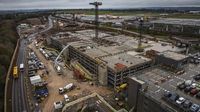Bristol Airport is taking significant strides towards expansion, aiming to accommodate 15 million passengers annually by 2040.
The ambition, detailed in a new masterplan, faces strong opposition from local authorities who argue that such an expansion contradicts the United Kingdom's Net Zero commitments.
On March 21, 2025, Bath and North East Somerset (B&NES) Councillors voted unanimously to oppose the airport's development plans. The council is determined to send a clear message that expanding Bristol Airport is incompatible with climate goals. This decision comes amidst Bristol Airport’s aspirations to increase capacity by adding over 14,000 additional flights per year, including up to 1,000 night flights.
Councillor Sarah Warren, the Cabinet Member for Climate Emergency and Sustainable Travel, emphasized the independent Climate Change Committee’s call to halt airport expansion, stating, "The most recent – very clear – recommendation... is to stop any further airport expansion and adopt a UK-wide capacity management framework." Warren argued that without this framework, the UK cannot hope to achieve its Net Zero goals and avert the worst impacts of climate change.
Chew Valley Councillor David Harding articulated the various problems that the airport brings to surrounding communities, including pollution, noise, and increased traffic. He remarked, “Bristol Airport is not a good neighbour...this will only get worse as the airport’s expansion is dependent upon ever-increasing car use.” He highlighted that the site’s access road is poorly equipped to handle the projected increase in passenger journeys, which are anticipated to reach 24 million annually.
In addition to air quality concerns, Councillor Harding pointed out the repercussions for local infrastructure, mentioning speeding cars and illegal parking that could intensify with the expansion. Publow with Whitchurch Councillor Paul May expressed his commitment to future generations, stating, “Our future rests with our children. We have a duty to protect them from the long-term impacts of climate change and the immediate damage from air pollution and traffic danger.”
The B&NES council’s motion to oppose the airport expansion was adopted with a decisive vote of 44 in favor, none against, and two abstentions, illustrating the council’s consolidated front against the proposed developments.
This stance is not new; local politicians have previously articulated opposition against Bristol Airport expansion in motions dating back to 2019 and 2022. In those resolutions, the council underscored the amplify local voices against the airport, noting significant community opposition regarding the past increase from 10 million to 12 million passengers.
In light of these concerns, the council is prepared to act as a statutory consultee for any forthcoming planning applications tied to the airport’s expansion and will call upon the government to reevaluate its support for airport expansion policies. The government has previously echoed support for airport growth, including proposed expansions at Heathrow and Gatwick, but the council insists that any decision should align with advice from the Climate Change Committee, which has cautioned against unchecked airport expansions.
Overall, the council believes that airport enlargement conflicts with the efforts made by the West of England Councils to tackle the Climate Emergency. They voiced their firm stance that the health and well-being of residents will be adversely affected by increased pollution and congestion, as well as unsafe conditions in their rural communities.
Warren concluded, “Sustainable aviation is a meaningless phrase... The airport and fossil fuel industries have been using it as greenwash.”
On the other hand, amid criticisms, Bristol Airport’s recent decision to innovate facilities through a £60 million investment has garnered attention. The project, spearheaded by Griffiths Farrans Joint Venture (GFJV), aims to create a new public transport interchange, add a multistorey car park, and enhance customer amenities to manage the anticipated increase in passenger numbers effectively.
That project is the largest investment by the airport since its £27 million terminal building opened in 2000, showing a desire to adapt to the current passenger demand. Despite the ongoing opposition, the airport experienced almost 10 million passengers in 2023, solidifying its position as the eighth-largest airport in the UK.
The planned enhancements will provide more than 2,000 additional parking spaces, a public transport hub for buses and coaches, and even a 48-meter link bridge connecting terminals to improve customer experiences.
However, this expansion and investment also raise concerns among local residents who worry that it will only worsen the already problematic traffic and environmental issues surrounding the airport. As the airport continues forward with its development plans, councils and communities remain vigilant, upholding their opposition while advocating for balanced approaches to both growth and environmental considerations.
With both the airport’s ambitious expansion plans and the firm opposition from local councils, the future of Bristol Airport remains a pressing topic. Whether local voices will alter the trajectory of growth remains to be seen, but one thing is certain: The conversation surrounding sustainable development in aviation is more salient than ever.


